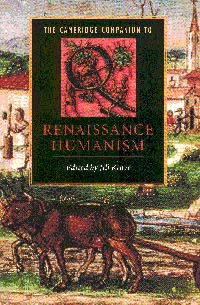Book contents
- Frontmatter
- 1 The origins of humanism
- 2 Classical scholarship
- 3 Humanism in script and print in the fifteenth century
- 4 The humanist reform of Latin and Latin teaching
- 5 Humanist rhetoric and dialectic
- 6 Humanists and the Bible
- 7 Humanism and the origins of modern political thought
- 8 Philologists and philosophers
- 9 Artists and humanists
- 10 Vernacular humanism in the sixteenth century
- 11 The new science and the traditions of humanism
- 12 Humanism and Italian literature
- 13 Humanism and English literature in the fifteenth and sixteenth centuries
- 14 Humanism and seventeenth-century English literature
- A guide to further reading in English
- Biographical index
13 - Humanism and English literature in the fifteenth and sixteenth centuries
Published online by Cambridge University Press: 28 May 2006
- Frontmatter
- 1 The origins of humanism
- 2 Classical scholarship
- 3 Humanism in script and print in the fifteenth century
- 4 The humanist reform of Latin and Latin teaching
- 5 Humanist rhetoric and dialectic
- 6 Humanists and the Bible
- 7 Humanism and the origins of modern political thought
- 8 Philologists and philosophers
- 9 Artists and humanists
- 10 Vernacular humanism in the sixteenth century
- 11 The new science and the traditions of humanism
- 12 Humanism and Italian literature
- 13 Humanism and English literature in the fifteenth and sixteenth centuries
- 14 Humanism and seventeenth-century English literature
- A guide to further reading in English
- Biographical index
Summary
Although humanism took root in the learned culture of fifteenth-century England, it was not until the next century that it bore fruit in vernacular literature. In the period between the Florentine humanist Poggio Bracciolini's visit to England (c. 1418-22) and Bishop William Waynflete's founding of Magdalen College School at Oxford (1480), English book collectors, diplomats and grammarians increased their knowledge of Italian classical learning. These cultural links with Italy fostered the creation of the humanist libraries and grammar schools which would educate the Tudor elite - among them the first great English humanist writer, Sir Thomas More, who, unlike many of his contemporaries, had no direct contact with Italy. As in Italy, humanism took root in England at a time when the education it promoted was suited to the needs of the governing classes: the monarch, members of the council, church officials and civil servants. It became necessary to write Latin well, with the humanist's attention to grammar and the elegantly subordinated syntax of the Ciceronian style, in order to carry on diplomatic and domestic matters of state. Since, however, this humanist programme was also appropriated and deployed to produce great literary works, it can be said to have been much more than a mere pragmatic tool to attain influence and power. Indeed, humanist-inspired works of literature even allowed for scepticism about the principles underlying the primary realm of power - the economy, politics, institutional religion - as well as criticism of the aims of humanism itself.
- Type
- Chapter
- Information
- The Cambridge Companion to Renaissance Humanism , pp. 246 - 268Publisher: Cambridge University PressPrint publication year: 1996
- 5
- Cited by



